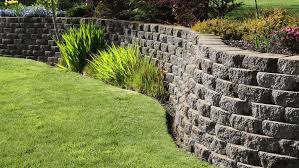Retaining walls is essential for preventing soil erosion, managing slopes, and creating usable land in your yard. Choosing the strongest type of retaining wall depends on several factors, including the soil type, the height of the wall, and the load it needs to support. Here’s a comprehensive guide to help you understand which type of retaining wall is the strongest and most suitable for your needs.
Types of Retaining Walls
Gravity Retaining Walls
- Description: Gravity retaining walls rely on their own weight to hold back soil. They are typically made from heavy materials like concrete, stone, or brick.
- Strength: These walls are strong and stable due to their mass and can be constructed to varying heights. However, they require a large amount of material and space to achieve the necessary stability.
- Best For: Suitable for shorter walls and projects where space for a thick base is available.
Cantilever Retaining Walls
- Description: Cantilever retaining walls are made of reinforced concrete with a thin stem and a base slab. The weight of the soil above the base helps hold the wall in place.
- Strength: These walls are very strong and efficient for supporting large loads and heights. The design reduces the amount of concrete required compared to gravity walls.
- Best For: Ideal for medium to tall walls and areas with limited space.
Sheet Piling Retaining Walls
- Description: Sheet piling walls use thin steel, vinyl, or wood planks driven into the ground to form a barrier. The planks are often anchored for additional support.
- Strength: Sheet piling is strong, especially when used with proper anchors. It’s an excellent choice for tight spaces and soft soils.
- Best For: Suitable for waterfronts, tight spaces, and temporary structures.
Anchored Retaining Walls
- Description: Anchored walls can be built using any of the other methods but include additional anchors or cables driven deep into the soil and attached to the wall.
- Strength: These are among the strongest types of retaining walls, capable of supporting extremely high loads and tall walls.
- Best For: Ideal for very tall walls and situations where the wall faces significant pressure.
Segmental Retaining Walls
- Description: Segmental retaining walls use interlocking concrete blocks without mortar. They stay in place through gravity and friction between the blocks.
- Strength: When properly constructed, these walls are durable and can handle moderate heights. They also allow for some flexibility, which can be beneficial in certain soil conditions.
- Best For: Perfect for garden walls, terraces, and DIY projects.
Factors Influencing the Strength of Retaining Walls
Soil Type
- Understanding Soil Conditions: The type of soil behind the wall significantly impacts the wall’s stability. Clay, sandy, and rocky soils each behave differently under pressure and require different wall designs.
- Drainage Needs: Proper drainage is crucial to prevent water buildup, which can increase pressure on the wall and cause failure. Incorporating drainage solutions such as weep holes or drainage pipes is essential.
Wall Height and Load
- Height Considerations: Taller walls need to withstand more pressure and typically require stronger materials and designs. Cantilever and anchored walls are preferable for taller structures.
- Load and Surcharge: Consider additional loads, such as driveways, buildings, or heavy equipment, that may add pressure to the retaining wall.
Construction Quality
- Professional Expertise: Hiring experienced retaining wall contractors ensures the wall is designed and constructed correctly, considering all relevant factors. Poor construction can lead to wall failure regardless of the material used.
- Building Codes and Permits: Ensure your wall meets local building codes and regulations. Obtaining the necessary permits and inspections is vital for a safe and compliant structure.
Choosing the Right Retaining Wall Contractors
- Experience and Expertise: Look for contractors with extensive experience in building various types of retaining walls. They should understand the local soil conditions and have a portfolio of successful projects.
- Reputation and Reviews: Check reviews and ask for references to gauge the contractor’s reliability and quality of work.
- Comprehensive Services: Choose contractors who offer a full range of services, from design and permitting to construction and maintenance. This ensures a seamless and cohesive process.
Conclusion
The strongest type of retaining wall depends on several factors, including soil type, wall height, load, and construction quality. Gravity, cantilever, sheet piling, anchored, and segmental retaining walls each have their strengths and are suited for different situations. By considering these factors and working with professionals, you can build a retaining wall that provides both functionality and longevity.

